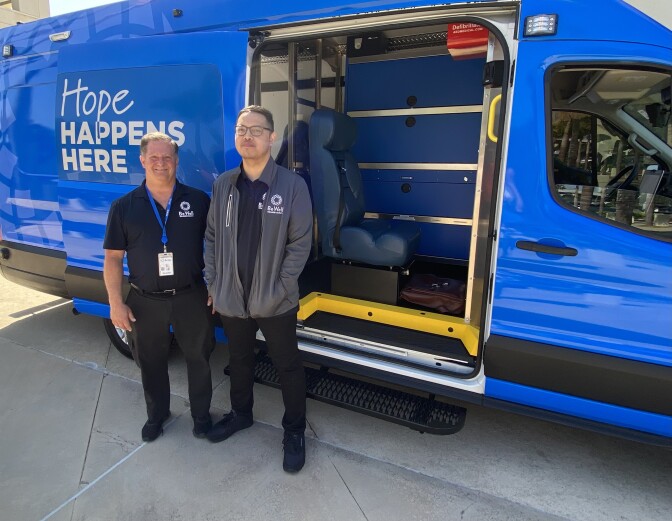Huntington Beach has become the latest city to try using unarmed behavioral health specialists instead of police to respond to non-violent mental health and substance use crises.
The city has partnered with a nonprofit provider, Be Well OC, which sends out two-person teams of crisis counselors. The idea is to keep people who need care out of jail.
Besides handling psychiatric and drug emergencies, the teams also go out on welfare checks.
That was the case for Erin Brooke Lee, who until recently was living out of her van. She said in the past she would be frightened when police checked on her, but she felt differently when the crisis counselors showed up last month.
“They helped me not be scared,” said Lee, adding that the counselors also helped her navigate confusing paperwork. “I got everything handled that’s going to play a part in me getting housing."
‘The Biggest Root Of It All Is Empathy’
In some cases, crisis counselors such as Laxon Sumawiganda will use de-escalation techniques to get people experiencing a mental health emergency to a crisis or detox center.
“The biggest root of it all is empathy and being able to read people,” he said.
“I have literally watched people be arrested because they had a mental health or substance abuse issue. And we’ve used our jails and prisons to engage in mass incarceration because we didn’t have the systems in place to deal with people properly,” Orange County D.A. Todd Spitzer said at a press conference Thursday announcing the full launch of the mobile response program.
Over the next few weeks, the effort will staff up to about 14 people, with two teams staffed seven days a week, from noon to midnight. The crisis counselors are dispatched from a non-emergency call line and 911 operators when appropriate.
During a month-long soft launch, Be Well OC said it handled about 330 calls for service. Orange County Supervisor Katrina Foley said the service could respond to some 15,000 calls a year.
“We need to have this model throughout Orange County,” she said.
The city of L.A is moving towards setting up a similar program on a pilot basis, while L.A. County is expanding its use of unarmed clinicians to respond to people in a mental health crisis.
Ask For Help
- Steinberg Institute website, links to mental health resources and care throughout California
- Institute on Aging's 24/7 Friendship Line (especially for people who have disabilities or are over 60), 1-800-971-0016 or call 415-750-4138 to volunteer.
- Los Angeles County Department of Mental Health, 24/7 Access Line 1-800-854-7771.
- The Crisis Text Line, Text "HOME" (741-741) to reach a trained crisis counselor.
- California Psychological Association Find a Psychologist Locator
- Psychology Today guide to therapist
If You Need Immediate Help
- If you or someone you know is in crisis and need immediate help, call the Suicide Prevention Lifeline at 988 or go here for online chat.
More Guidance
- Find 5 Action Steps for helping someone who may be suicidal, from the National Suicide Prevention Lifeline.
- Six questions to ask to help assess the severity of someone's suicide risk, from the Columbia Lighthouse Project.
- To prevent a future crisis, here's how to help someone make a safety plan.









